|
|
|
Sort Order |
|
|
|
Items / Page
|
|
|
|
|
|
|
| Srl | Item |
| 1 |
ID:
159167
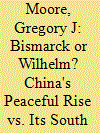

|
|
|
|
|
| Summary/Abstract |
The choice facing China today is whether it will follow the precedent set by Otto von Bismarck—which appears to be its stated goal—or whether it will (intentionally or unintentionally) follow the path of another German leader, Kaiser Wilhelm, and pursue a policy of military growth, territorial and/or maritime expansionism, and a relative disregard for the concerns of its neighbors. The South China Sea will be an important test case, an arena where China's choices will impact its relations with its neighbors and other great powers like the United States.
|
|
|
|
|
|
|
|
|
|
|
|
|
|
|
|
| 2 |
ID:
122949
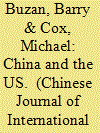

|
|
|
|
|
| Publication |
2013.
|
| Summary/Abstract |
Competing great powers, and the potential for clashes among them when there are changes of place at the top of the hierarchy, are an old story in international relations. Against this realist model of inevitably warlike power struggles stands another idea: 'peaceful rise'. China committed itself to this policy a decade ago, and arguably adopted it as far back as the shift to reform and opening up in the late 1970s. The only other modern great power than can possibly claim to have risen peacefully is the United States. Since there are only two cases of attempted peaceful rise, it is worth asking what parallels can be drawn between the United States and Chinese experiences. Given their different placements in history, with the rise of the United States having taken place between 1865 and 1945, a century earlier than China's current rise, what lessons, if any, can be learned for China from the United States experience? This article looks closely at both the meaning of 'peaceful rise' and the credibility of the United States and Chinese claims to it. It surveys the key points of similarity and difference between the United States and China during their process of rise, comparing contemporary China with the United States of the late 19th and early 20th centuries, not with today's United States. The conclusion sets out six lessons for China and for international society that can be drawn from comparing the two cases.
|
|
|
|
|
|
|
|
|
|
|
|
|
|
|
|
| 3 |
ID:
094970
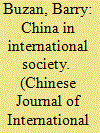

|
|
|
|
|
| Publication |
2010.
|
| Summary/Abstract |
This article reviews China's position in international society over the past couple of centuries, and against that background assesses the prospects for China's strategy of 'peaceful rise'. I stick to the label 'peaceful rise' because it is a more accurate statement of the issues than the more anodyne and diplomatic 'peaceful development' which has recently replaced it in official Chinese discourse.1 I understand 'peaceful rise' to mean that a growing power is able to make both absolute and relative gains in both its material and its status positions, in relation to the other powers in the international system, and to do so without precipitating major hostilities between itself and either its neighbours or other major powers. Peaceful rise involves a two-way process in which the rising power accommodates itself to rules and structures of international society, while at the same time other powers accommodate some changes in those rules and structures by way of adjusting to the new disposition of power and status. I am not going to question whether China will rise or not, though this is done by some.2 Instead, I take China's continued rise as given, and explore whether its peaceful rise is possible within contemporary international society.
|
|
|
|
|
|
|
|
|
|
|
|
|
|
|
|
| 4 |
ID:
107185
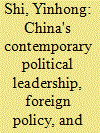

|
|
|
|
|
| Publication |
2011.
|
| Summary/Abstract |
There have been several profound features embedded in the contemporary Chinese political leadership, all having their roots in the Chinese centuries-long traditions or the modern/contemporary creative practice, together with their shaping impacts upon China's foreign policy or remarkable reflections in her external behavior. They are: reforms inherently differentiated; central idea of "maintenance", notion of "biological circle governing universe", paradox in the question of equality, the emphasis on morality, overwhelmingly domestic function of foreign policy, firm belief in the Chineseness per sue and its overwhelming importance, and political prudence in the perennial context of "Strong China, Weak China." China is facing enormous domestic historical challenges and substantial international pressure, while a generally peaceful China can be assured at least from her self-regarding realistic perspective.
|
|
|
|
|
|
|
|
|
|
|
|
|
|
|
|
| 5 |
ID:
107167
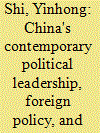

|
|
|
|
|
| Publication |
2011.
|
| Summary/Abstract |
There have been several profound features embedded in the contemporary Chinese political leadership, all having their roots in the Chinese centuries-long traditions or the modern/contemporary creative practice, together with their shaping impacts upon China's foreign policy or remarkable reflections in her external behavior. They are: reforms inherently differentiated; central idea of "maintenance", notion of "biological circle governing universe", paradox in the question of equality, the emphasis on morality, overwhelmingly domestic function of foreign policy, firm belief in the Chineseness per sue and its overwhelming importance, and political prudence in the perennial context of "Strong China, Weak China." China is facing enormous domestic historical challenges and substantial international pressure, while a generally peaceful China can be assured at least from her self-regarding realistic perspective.
|
|
|
|
|
|
|
|
|
|
|
|
|
|
|
|
| 6 |
ID:
142020


|
|
|
|
|
| Summary/Abstract |
Since the leadership transition in China in November 2012, there have been significant changes in Chinese foreign policy. It has been widely observed that under the new leadership headed by President Xi Jinping, Beijing has become more assertive in international affairs. This paper ex- amines the emerging contours of China's foreign policy under Xi and the implications for the future regional order in the Asia Pacific. It argues that recent international behaviour of China is the manifestation of a new phase of Chinese foreign policy that could be defined as ‘peaceful rise 2.0’. In this analysis, while Beijing still adheres to its declared ‘peaceful development’ policy aiming to maintain a stable external environment conducive to its ascendance, the manner in which it seeks to do so are considerably different from past decades. The paper further argues that despite China's growing power, President Xi faces greater difficulties than his predecessor to achieve his foreign policy objectives. Indeed Beijing's capacity to shape the regional environment in its favour in the near future is arguably declining rather than increasing.
|
|
|
|
|
|
|
|
|
|
|
|
|
|
|
|
| 7 |
ID:
082798
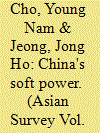

|
|
|
|
|
| Publication |
2008.
|
| Summary/Abstract |
This article analyzes discussions, resources, and prospects for soft power in China, focusing on the Beijing Consensus, foreign policy, and civilization. It posits that the country's recognition of soft power and its application to national policies is an important factor in explaining China's rapidly increasing influence in Asia.
|
|
|
|
|
|
|
|
|
|
|
|
|
|
|
|
| 8 |
ID:
178740


|
|
|
|
|
| Summary/Abstract |
Over the past fifteen years, China has turned from a bystander of international peacekeeping operations (PKO) to one of their biggest contributors, often explained in terms of norm adoption or securing Chinese overseas investments.
This article sketches the historical evolution of China’s approach to peacekeeping through a role theory prism, explaining policy shifts through changing Chinese self-images and desired roles on the international stage. By studying influential academic and official discourses surrounding Chinese engagement with PKOs, it details processes of role contestation, and how peacekeeping became served to translate newly adopted roles into concrete policies. Finally, the article closes by examining China’s growing ambitions as a peace-bringer and the emergence of an indigenous doctrine on the peace/development nexus that could undergird future Chinese agency in conflict settings.
|
|
|
|
|
|
|
|
|
|
|
|
|
|
|
|
| 9 |
ID:
092400


|
|
|
|
|
| Publication |
2009.
|
| Summary/Abstract |
Illuminating on the power transition theory, realists are more than convinced of potential structural conflicts in both economic and security realms due to China's rise. They see China as a dormant source of challenges to American preeminence, economic policies of the west as evident in the recent negotiation discourses (e.g., G-20 and G-8 meetings), the "western" norms of diplomacy (e.g., Washington consensus) in developing countries including in Africa, and security concerns of its neighboring states. However, China will be able to avoid this claimed inevitability by abiding to peaceful ideas deeply embedded in "New Security Concept," "peaceful rise theory," "peaceful development" and a "harmonious world" doctrine. This paper argues that China will be able to rise peacefully because of the efficacy of practicing liberalism and constructivism at large in its diplomacy. China is increasingly and genuinely embracing shared norms and institutions, gradually gravitating East Asian regional order to its favor in the form of power constellation.
|
|
|
|
|
|
|
|
|
|
|
|
|
|
|
|
| 10 |
ID:
082181
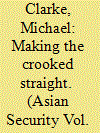

|
|
|
|
|
| Publication |
2008.
|
| Summary/Abstract |
This article argues that China's foreign policy since 1991 has been guided by the evolution of a grand strategy of "peaceful rise" that seeks to ensure China's smooth transition to great power status. Moreover, it suggests that a strategic preoccupation with Central Asia has become an important expression of this grand strategy. Framing these arguments is a third overarching one that postulates that China's foreign policy in Central Asia is not only intimately related to the strategy of "peaceful rise" but also to a particular, historically and geopolitically informed narrative of China's "Inner Asian" power
|
|
|
|
|
|
|
|
|
|
|
|
|
|
|
|
| 11 |
ID:
113970
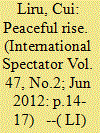

|
|
|
|
|
| Publication |
2012.
|
| Summary/Abstract |
China intends to realise its national resurgence and modernisation through a peaceful path by integrating into or accepting and participating in the existing international system. With reform and opening up as its hallmark, China's growth model is in a sense a marriage between Oriental and Occidental civilisations in the age of globalisation. Openness and inclusiveness are the intrinsic attributes of this model. China's diplomacy since 1978 is essentially an extension of the national modernisation drive, its chief task, basic policies and behavioural patterns being the creation of an international environment conducive to this endeavour.
|
|
|
|
|
|
|
|
|
|
|
|
|
|
|
|
| 12 |
ID:
143680


|
|
|
|
|
| Summary/Abstract |
The bargaining for a new role in world politics presents a rising power with a strategic dilemma, as the new role entails a new power position in the system and a new social status in international society. China’s assertiveness in diplomacy after 2008 can be seen as a ‘role bargaining’ process between China and the outside world, such as China’s bargaining for a new role in the global financial system through the Asian Infrastructure Investment Bank (AIIB). This article aims to examine how a rising power can bargain for the new role in a peaceful way. Based on rational bargaining theory and on role theory, we suggest four strategies whereby a rising power bargains for a new role: costly signalling, self-restraint, role-diversification, and alter-casting. Through focusing on China’s World Trade Organization accession and integration into the global economy after the Cold War, we examine the utilities and limitations of these four role-bargaining strategies for a rising power in the international system. The first two strategies aim to address the information and commitment problems concomitant with rationalism that a rising power faces in negotiating a new power position, and the last two strategies focus on how a rising power can bargain for a new social role by balancing the self’s role conception and the role expectations of others.
|
|
|
|
|
|
|
|
|
|
|
|
|
|
|
|
|
|
|
|
|